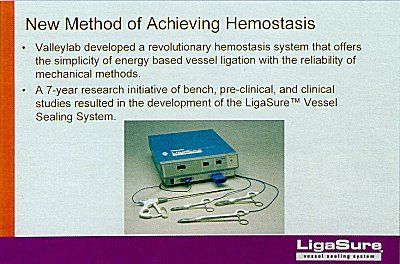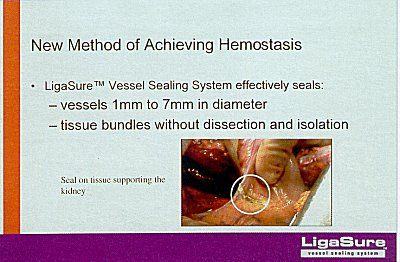Vessel Sealing Tool Effective in Laparoscopic Colon Surgery
BOSTON-A new electrosurgical tool that seals blood vessels without staples or vascular clips is safe and effective for laparoscopic colon surgery, according to a study reported at the American Society of Colon and Rectal Surgeons (ASCRS) annual meeting.
BOSTONA new electrosurgical tool that seals blood vessels without staples or vascular clips is safe and effective for laparoscopic colon surgery, according to a study reported at the American Society of Colon and Rectal Surgeons (ASCRS) annual meeting.
Marjan Aleali, MD, assessed the LigaSure Vessel Sealing System from July 1999 to July 2000 at The Mount Sinai Medical Center, New York, where she was a fellow in colorectal surgery.
She and her co-authors used the device to ligate mesenteric vessels in 28 procedures on the surgical service headed by Jeff W. Milsom, MD, chief, Division of Colorectal Surgery, and co-chief, Minimally Invasive Surgery Center.
The purpose of the study was to assess the devices performance in sealing vessels in laparoscopic colon surgery. It was the only modality used for hemostasis, Dr. Aleali told ONI. A total of 87 vessels were ligated without any intraoperative or postoperative bleeding.
Not only did the LigaSure system work, Dr. Aleali said, but it also proved to be faster, more economical, and potentially safer than staples and clips. The researchers concluded that the LigaSure system could replace these methods in lapa-roscopic colon surgery.
ValleyLab, a division of Tyco Health-care Group, Boulder, Colorado, developed and markets the LigaSure system, which consists of a bipolar radio frequency generator and four hand pieces to be used in laparoscopic, urologic, gynecologic, and general surgery procedures.
The device fuses collagen and elastin in vessel walls to create a permanent seal for veins and arteries 7 mm or smaller and for tissue bundles. These seals can withstand more than three times normal systolic pressure, according to clinical studies reported by ValleyLab.


Earlier studies described the sealing systems use in urologic cancer surgery, laparoscopic nephrectomy, radical retropubic prostatectomy, hemorrhoidectomy, and living donor liver and kidney transplant surgery.
Mt. Sinai was the first colorectal team to study the LigaSure system in lapa-roscopic surgery, said Dr. Aleali who is now a fellow in colorectal surgery at St. Lukes-Roosevelt Hospital, also in New York City. As you can imagine, in laparoscopic surgery, there would be very severe consequences if the device didnt work. We did not have any complications related to LigaSure use.
Cutting costs is a big motivation for using the system, Dr. Aleali said. Each staple requires a new stapling refill, but the disposable hand piece for the LigaSure system can be used for an entire operation before being replaced. To do an entire colon, it is definitely cost-effective, she said, and you dont have to worry about leaving any clips behind.
The system is also faster than traditional methods, she said, speculating that it might also reduce operating room time for major surgery. In the study, a sealing application took 10 seconds or less. If a second application was needed to seal the vein completely, it usually took even less time, Dr. Aleali said.
From our early experience using the LigaSure system in laparoscopic surgery, we feel its safe and effective. It will ultimately save time and cost to the patient and institution, she said.
How Supportive Care Methods Can Improve Oncology Outcomes
Experts discussed supportive care and why it should be integrated into standard oncology care.